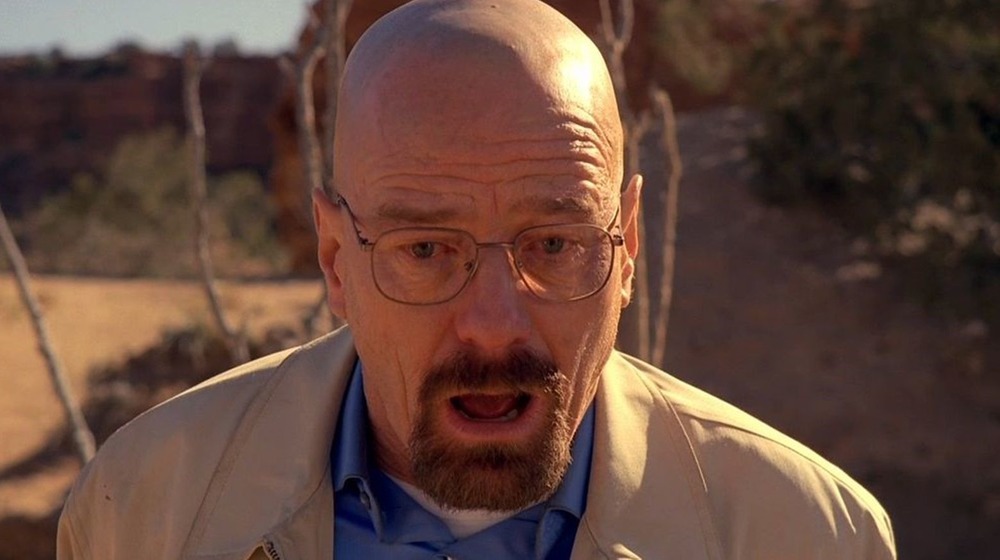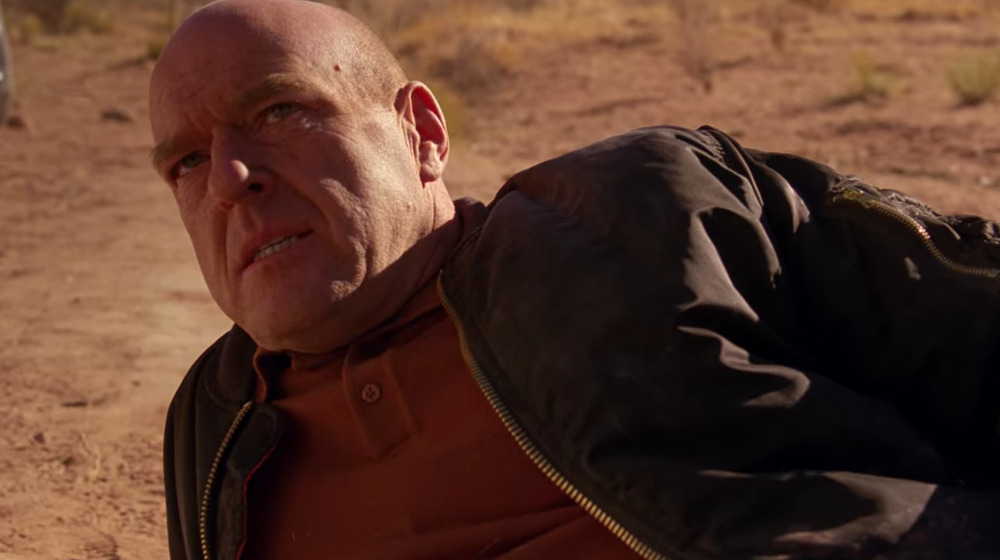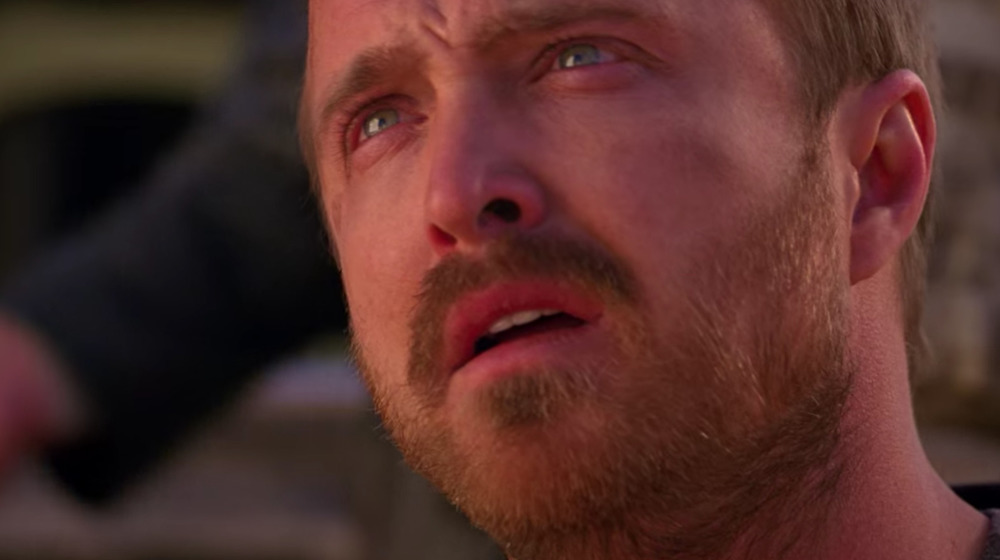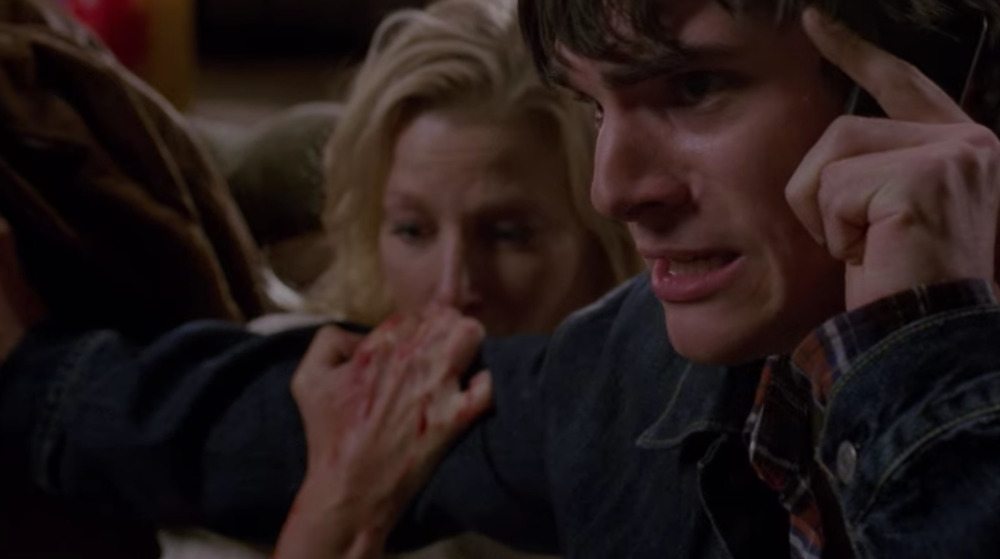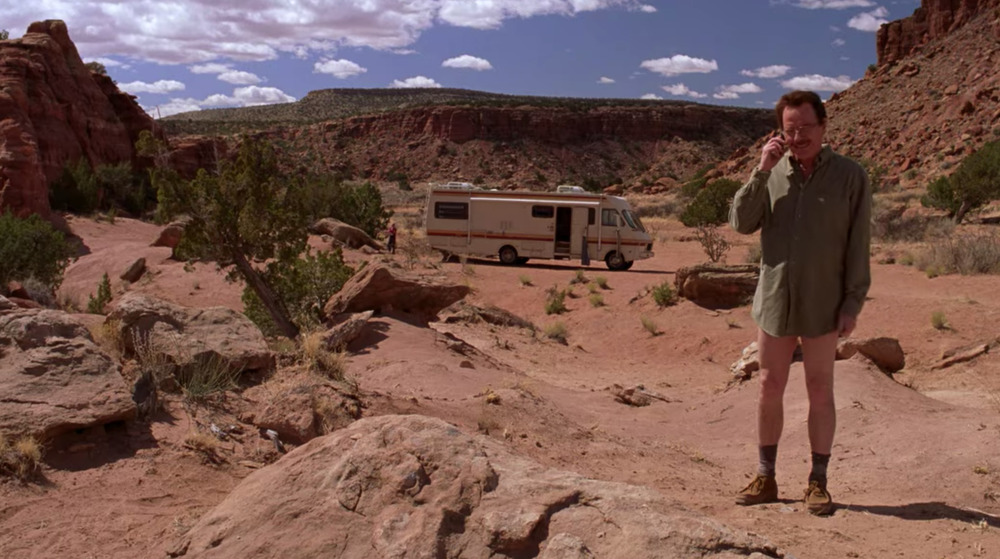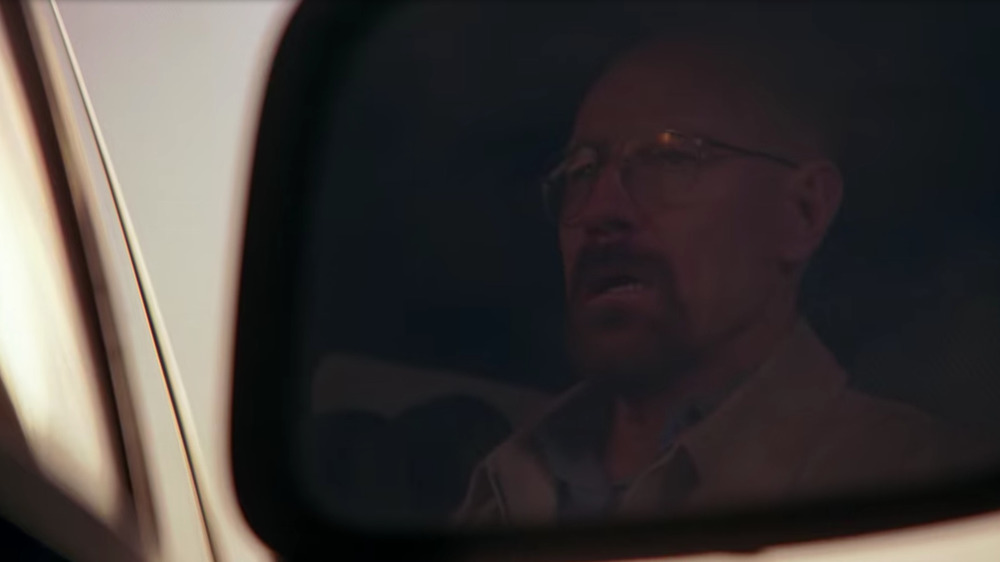The Most Important Episode Fans Of Breaking Bad Need To Rewatch
Before the final season of Breaking Bad premiered, AMC released an unconventional ad to get fans buzzing. Instead of showing clips from the upcoming episodes, it gave us a tour of Albuquerque, New Mexico via desolate footage of some of the series' most memorable set pieces. While we looked upon the iconic RV, the Vamanos Pests tarps, and the A1A car wash, Bryan Cranston (the actor who plays Walter White) recited Percy Bysshe Shelley's poem "Ozymandias." Even if you weren't a Breaking Bad fan, hearing him seethe "look on my Works, ye Mighty, and despair" was enough to give you chills.
While the words from that poem never featured in any of the series' dialogue, it did inspire the title of the antepenultimate episode. It's safe to say that a poem about the destructive and temporary nature of power was a fitting theme for the pivotal chapter of the series — one that many, including Breaking Bad's creator Vince Gilligan, consider to be the series' strongest entry.
But it isn't just the best of the best of Breaking Bad. From its long-awaited revelations and series-altering deaths to the crucial new developments for pretty much every character, here's why "Ozymandias" is Breaking Bad's most important episode, and more than worthy of a rewatch.
'Ozymandias' gives us Hank at his best
Anyone who watched Breaking Bad from the beginning knew it was always building to a brutal final confrontation between Walter White and his DEA agent brother-in-law Hank Schrader (Dean Norris). We always knew Hank would figure out that the scientist-turned-criminal-mastermind was actually Heisenberg, and when he finally put the pieces together in the final moments of the series' fifth midseason finale, we knew it was only a matter of time before the skirmish happened.
Still, few of us probably expected their final moments together to go the way they did. Instead of a dramatic face-off between the two, they both wind up at the mercy of Jack Welker (Michael Bowen) and his gang after the desert shootout in "To'hajiilee" left Hank's beloved partner Steven Gomez (Michael Bowen) dead. Instead of being the one to kill Hank in order to keep his meth empire intact, Walt ends up offering Jack his $80 million fortune in a desperate attempt to save him. Hank, being the most Hank he could possibly be, refuses to beg for his life. Instead, he is defiant and uses his last moments on Earth to let Walt know he thinks he's actually pretty stupid for believing Jack would spare him.
It's not the payoff many fans would have wanted for Hank, but he still earned his own version of a hero's ending. And while it was maybe an unexpected conclusion to his journey, we still got the closure we needed when he went out on his own terms.
Jesse Pinkman's story takes another tragic turn
No one had an easy time of it during Breaking Bad's five-season run, but few characters had a harder go than Jesse Pinkman (Aaron Paul). That continues to be the case in "Ozymandias," when he ends up in the possession of Jack's gang, who are definitely planning to kill him once they find out what info he leaked to the DEA. That would be bad enough, but right before he's carted off by Jack's lackeys, Walt decides to take his grief and fury about Hank's death out on Jesse. He confesses to Jesse that he could have stopped Jesse's former girlfriend Jane (Krysten Ritter) from choking to death, but he didn't. It's really the ultimate way to kick a man when he's down.
This revelation is really just the beginning of a tortuous period for poor Jesse. It ends up being essential for him, though — something that helps him really understand how much damage his former partner did to his life. It's not the only bridge Walt ends up burning, either.
The White family reach a stunning breaking point
The family drama in Breaking Bad was always one of its high points, and the slow-building tension and animosity between Walt and his wife Skyler (Anna Gunn) over the course of five seasons led to many of its most memorable moments – none more so than what goes down after Walt returns home from the desert in "Ozymandias."
Walter Jr. (RJ Mitte) is still reeling from the knowledge that his parents don't actually just run a car wash. Walt wants everyone to hurry and pack their stuff so they can skip town before it's too late. Holly won't stop crying. Amidst the quickly-building tension, Skyler has come to the conclusion that Walt killed Hank, and that's her breaking point. In the course of a few chaotic minutes, Skyler slashes Walt with the kitchen knife she grabbed to defend herself, he tackles her to the ground as they fight over the weapon, and even Walter Jr. joins the fray before he calls the police. Walt then panics, grabs a bag and his daughter, and leaves before Skyler can stop him.
Not only is it one of the most intense scenes out of any Breaking Bad episode, but it also marks the most important breaking point for Walt. He's resorted to intimidation for so long, that when it no longer works on Skyler, he realizes he's running out of options. Combine that knowledge with the terror he sees on his family's face at how badly things have deteriorated between them, and it's no wonder he sees no other choice but to run.
Without Ozymandias, there would be no Felina
Few TV series have managed to pull off as effective a finale as Breaking Bad. "Felina" works in large part because everything that came before set it up perfectly — especially the events of "Ozymandias."
The episode begins with a familiar callback to the series' first season, showing Walt — clad in only his plaid shirt, underwear, socks, and shoes — calling Skyler from the scene of his first cook with Jesse. Throughout "Ozymandias," we see more signs of Walt's humanity than we have in a long time. Between his devastation over Hank's death and his slow realization that he's really made a mess of things, he begins to put the pieces in motion toward the last leg of his journey. That means doing a few things right — like dropping Holly off safely at a fire station so she can be reunited with Skyler and Walter Jr.
By calling Skyler, knowing full well their home phone has been tapped, Walt helps absolve her of the role she played in their criminal enterprise. His assertions that she never helped him are about as far from the truth as you can get, but it gives her an out — and a way to keep their family together without him. It also means he has to face the remainder of the loose ends in his life alone.
By the end of "Ozymandias," the stakes have never been higher: Jesse is a captive with a renewed sense of grief, Walt is a fugitive with a new identity, and there are a lot of people who still need, or want, something from him. The payoff in Breaking Bad's finale, "Felina," would not have been nearly as satisfying if the stakes hadn't been set so high in "Ozymandias."
Ozymandias' legacy is undeniable
In more ways than one, "Ozymandias" showcases everything that was great about Breaking Bad: incredible performances, riveting tension between characters, and one of the most satisfying developments of a narrative arc in TV history. When it comes to the episode's impact, don't just take our word for it. "Ozymandias" has been widely lauded for its masterclass storytelling, with everyone from The Independent to The Hollywood Reporter naming it the series' greatest episode.
It also led to some of Breaking Bad's final accolades. Moira Walley-Beckett won the Emmy Award for Outstanding Writing for a Drama Series for her "Ozymandias" script. Bryan Cranston and Anna Gunn won Outstanding Lead Actor and Lead Actress in a Drama Series, respectively, after submitting the episode for Emmy consideration, too.
"Ozymandias" may not ostensibly be the most buzz-worthy episode of Breaking Bad, and there are many others that are every bit as memorable. However, it was the most essential piece of the series' intricate puzzle, both in terms of setting up its superb conclusion and cementing its legacy.
